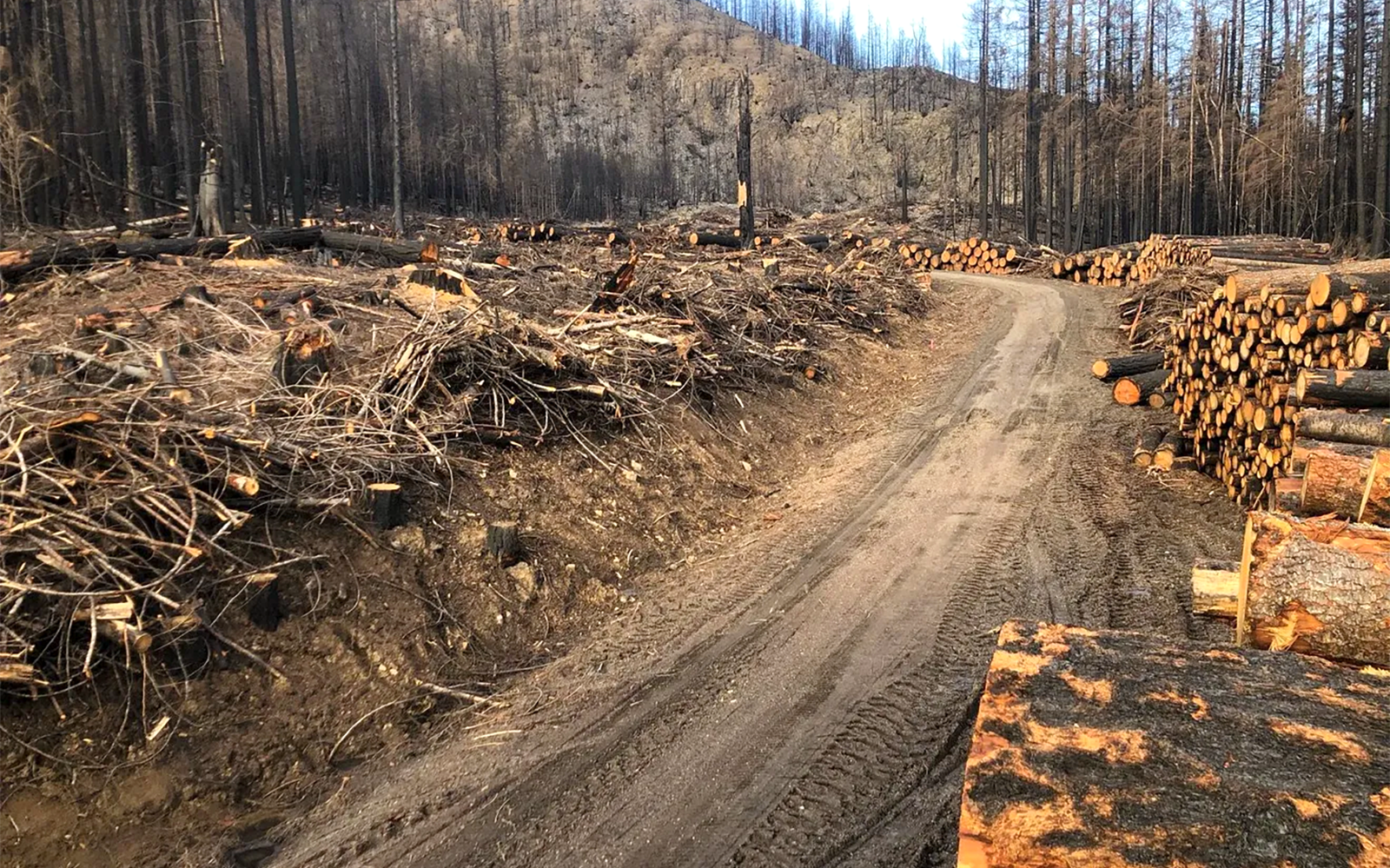For Immediate Release
April 13, 2021
Contacts:
Bethany Cotton, Conservation Director, Cascadia Wildlands; email, 503.327.4923
Tim Ingalsbee, Executive Director, Firefighters United for Safety Ethics and Ecology (FUSEE); email, 541.338.7671
Conservationists Call on Biden Admin to Rein in Destructive Post-Fire Roadside Logging
Widespread Post-Fire Clearcutting Threatens Drinking Water, Climate Resilience, Wildlife
Eugene, Oregon — Today, over twenty conservation and climate justice organizations sent a letter to Cabinet Secretaries Deb Haaland of the Department of the Interior and Tom Vilsack of the Department of Agriculture opposing the sweeping post-fire roadside logging proposed or actively being carried out by their respective agencies. The organizations are calling for an end to the blanket prescription linear clearcuts within the perimeters of the 2020 Labor Day wildfires, and a halt to the use of Categorical Exclusions (CE) by federal land management agencies to bypass environmental review and public participation. These clearcuts are up to 200 feet wide on both sides of roadways, adding up to tens of thousands of acres of clearcuts in addition to the hundreds of thousands of acres of private land clearcuts and proposed public lands post-fire logging.
The letter comes as tens of thousands of acres of “hazard” tree removal road and riverside logging are proposed and taking place along federal public forest roads across the State of Oregon. In the past six months, hundreds of thousands of acres of private timberland were already clearcut.
“The roadside clearcutting of burned forests is an insult to the safety risks, health hazards, and hard work that wildland firefighters subjected themselves to save those trees,” said Timothy Ingalsbee, executive director of Firefighters United for Safety, Ethics, and Ecology (FUSEE). “Worse, the logging will greatly amplify the fire risks and fuel hazards affecting future firefighters if and when they are sent to the weedy brushfields that grow up in the wake of clearcutting.”
Community members and environmental organizations are raising concerns about the serious ecological impact that heavy logging has on post-fire forests and watersheds. Research shows that post-fire logging damages the local environment and delays forest recovery, while releasing large amounts of carbon — further exacerbating the global climate crisis. Agencies permit the logging under the scientifically unsound theory of “salvage,” implying burned forests must be clearcut to save value. In truth, burned forests provide habitat for myriad fire-dependent wildlife and plant species, sequester carbon, and naturally recover if only left to do so.
“Far from improving public safety, the unprecedented scale of road and riverside logging is further endangering imperiled species, undermining climate resilience, and jeopardizing drinking water sources for hundreds of thousands of Oregonians,” said Bethany Cotton, conservation director for Cascadia Wildlands. “Federal agencies are attempting to circumvent scientific analysis and public process, by claiming these impacts are minimal when nothing could be further from the truth.”
The organizations are also calling on the Secretaries of Interior and Agriculture to promulgate clear, science-based post-fire hazard tree removal and remediation regulations applicable across federal agencies via notice and comment public rulemaking to ensure transparency, clarity and consistency.
The signatory organizations are: Cascadia Wildlands, Center for Biological Diversity, Western Environmental Law Center, Firefighters United for Safety Ethics and Ecology, Breach Collective, Kalmiopsis Audubon Society, Forest Web, Soda Mountain Wilderness Council, 350PDX, Redwood Region Audubon Society, Klamath-Siskiyou Wildlands Center, John Muir Project, Sunrise PDX, Sunrise Eugene, Bark, Western Watersheds Project, Blue Mountain Biodiversity Project, South Umpqua Rural Community Partnership, Oregon Wild, Environmental Protection Information Center, WildEarth Guardians.
###
Background and Resources:
Read more about the impacts of post-fire roadside logging here and here. Find photos of ongoing post-fire roadside logging here.
Post-fire logging typically removes most of the remaining trees and involves intense road building and maintenance, the planting of non-native species and the application of toxic herbicides. The combined impacts of these actions disrupt forest health, degrade habitat, harm forested watersheds, and impact aquatic ecosystems by driving erosion and removing potential habitat in the form of woody debris (Karr et al. 2004, Donato et al. 2006, Reeves et al. 2006).
Logging emits far more carbon than even severe wildfire (Law et al. 2018). While fire-killed trees may take several decades or even centuries to decompose, during the logging and milling process, most of the carbon is rapidly released into the atmosphere (Smith et al. 2006, Gower et al. 2006). Post-fire logging undercuts the natural sequestration and storage capacity of post-fire forests and contributes to carbon emissions that worsen climate change.
In congressional testimony to the House Subcommittee on Resources (November 10, 2005, hearing on HR4200), University of Washington Professor Jerry Franklin said “Timber salvage is most appropriately viewed as a ‘tax’ on ecological recovery.”
Cascadia Wildlands is a Eugene-based nonprofit working to defend and restore Cascadia’s wild ecosystems in the forests, in the courts, and in the streets.
Firefighters United for Safety, Ethics, and Ecology (FUSEE) conducts public education and policy advocacy promoting safe, ethical, ecological fire management

